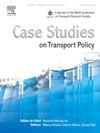Modeling motorcycles dependency for commuting among low-income communities in Yogyakarta, Indonesia: The perspective of the theory of planned behavior
IF 2.4
Q3 TRANSPORTATION
引用次数: 0
Abstract
The high degree of reliance on motorcycles for daily commuting in low-income communities of the Special Region of Yogyakarta has emerged as a pressing transportation issue, stemming from economic disparities that have led many low-income individuals to experience transport or mobility poverty, further constricting their overall mobility. This reliance on motorcycles as the predominant mode of transport demands attention, as it conflicts with the principles of sustainable mobility. The present study collected survey data from 430 respondents in order to explore this phenomenon. The study then examined socioeconomic conditions, mobility patterns, and behavioral factors among the respondents using the theory of planned behavior (TPB) framework, with the structural equation model (SEM) serving as the analytical tool. The findings of the study reveal that cost savings, time efficiency, and societal factors exert a significant influence on the high reliance of low-income communities on motorcycle use. These findings underscore the practicality and affordability of motorcycles, which, in the absence of viable alternatives, become the primary mode of daily commuting.
印度尼西亚日惹低收入社区的摩托车依赖性建模:计划行为理论的视角
日惹特区低收入社区的日常通勤高度依赖摩托车已成为一个紧迫的交通问题,其根源是经济差距导致许多低收入个人经历交通或流动性贫困,进一步限制了他们的整体流动性。这种对摩托车作为主要交通方式的依赖需要引起注意,因为它与可持续移动的原则相冲突。本研究收集了430名受访者的调查数据,以探讨这一现象。本研究以计划行为理论(TPB)为框架,以结构方程模型(SEM)为分析工具,考察了被调查者的社会经济条件、流动模式和行为因素。研究结果表明,成本节约、时间效率和社会因素对低收入社区对摩托车使用的高度依赖有显著影响。这些发现强调了摩托车的实用性和可负担性,在缺乏可行的替代品的情况下,摩托车成为日常通勤的主要方式。
本文章由计算机程序翻译,如有差异,请以英文原文为准。
求助全文
约1分钟内获得全文
求助全文

 求助内容:
求助内容: 应助结果提醒方式:
应助结果提醒方式:


